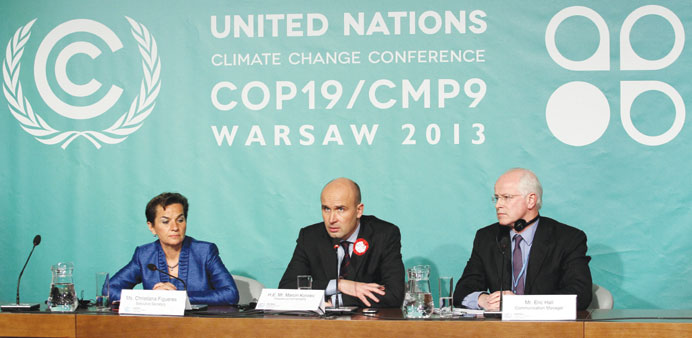Figueres, president of COP19 and Polish Environment Minister Marcin Korolec, and COP spokesman Eric Hall are seen during a press conference at the UN Climate Change Conference 2013 at the National Stadium in Warsaw.
AFP/Warsaw
Nations launched a new round of talks yesterday for a 2015 deal to cut Earth-warming greenhouse gas emissions in the aftermath of a Philippines typhoon that the UN’s climate chief labelled “sobering”.
The 12-day United Nations talks opened amid a slew of warnings about potentially disastrous warming with increasingly extreme weather phenomena unless humankind changes its atmosphere-polluting, fossil-fuel burning ways.
“What happens in this stadium is not a game. There are not two sides but the whole of humanity. There are no winners and losers, we all either win or lose in the future we make for ourselves,” UN climate chief Christiana Figueres said.
“We gather today under the weight of many sobering realities,” she added – the first being the new record of 400 parts per million (ppm) of carbon dioxide (CO2) in the atmosphere that was reached earlier this year. “The second is the devastating impact of Typhoon Haiyan, one of the most powerful typhoons to ever make landfall. Our thoughts and our prayers are with the people of the Philippines, Vietnam and Southeast Asia.” (See also page 28)
The UN has set a target of limiting global average warming to two degrees Celsius (3.6 degrees Fahrenheit) over pre-Industrial Revolution levels – at which scientists believe we can avoid the worst effects of climate change.
The world seeks to reach that goal by curbing emissions of invisible, heat-trapping gases from burning fossil fuels which provide the backbone of the world’s energy supply today.
Reducing this pollution requires a costly shift to cleaner, more efficient energy, which helps to explain why the UN negotiations have been such a battlefield.
Experts say the 2C objective, set in 2009, is likely to be badly overshot on current emissions trends.
Last week, the UN Environment Programme said the chances of meeting the two-degree goal were “swiftly diminishing”, while the World Meteorological Organisation reported atmospheric levels of greenhouse gases hit a new record high in 2012.
In September, the UN’s Intergovernmental Panel on Climate Change predicted global surface temperatures could climb on average by as much as 4.8C this century – a recipe for catastrophic heatwaves, floods, droughts and sea-level rise.
Though the stakes are high, no specific targets have been set for this round of the annual talks, hosted by one of the world’s biggest coal polluters just two years before the tortuous global process must deliver a global deal.
Observers hope negotiators will do some legwork for the much-trumpeted agreement, due to be signed in Paris in 2015 for implementation five years later.
The talks are scheduled to wrap up on November 22, at ministerial level.
The gloves are expected to come off over help for poorer nations to cope with climate change.
Rich economies have yet to show how they intend to meet a pledge, made back in 2009, to muster $100bn per year from 2020.
Figueres said climate change has left future generations facing “a monumental uphill struggle” that can be alleviated with finance “that enables the entire world to move towards low-carbon development”.
“This is the conference to move faster, higher, stronger towards the socially equitable and economically sustainable future we want and need,” she said.

